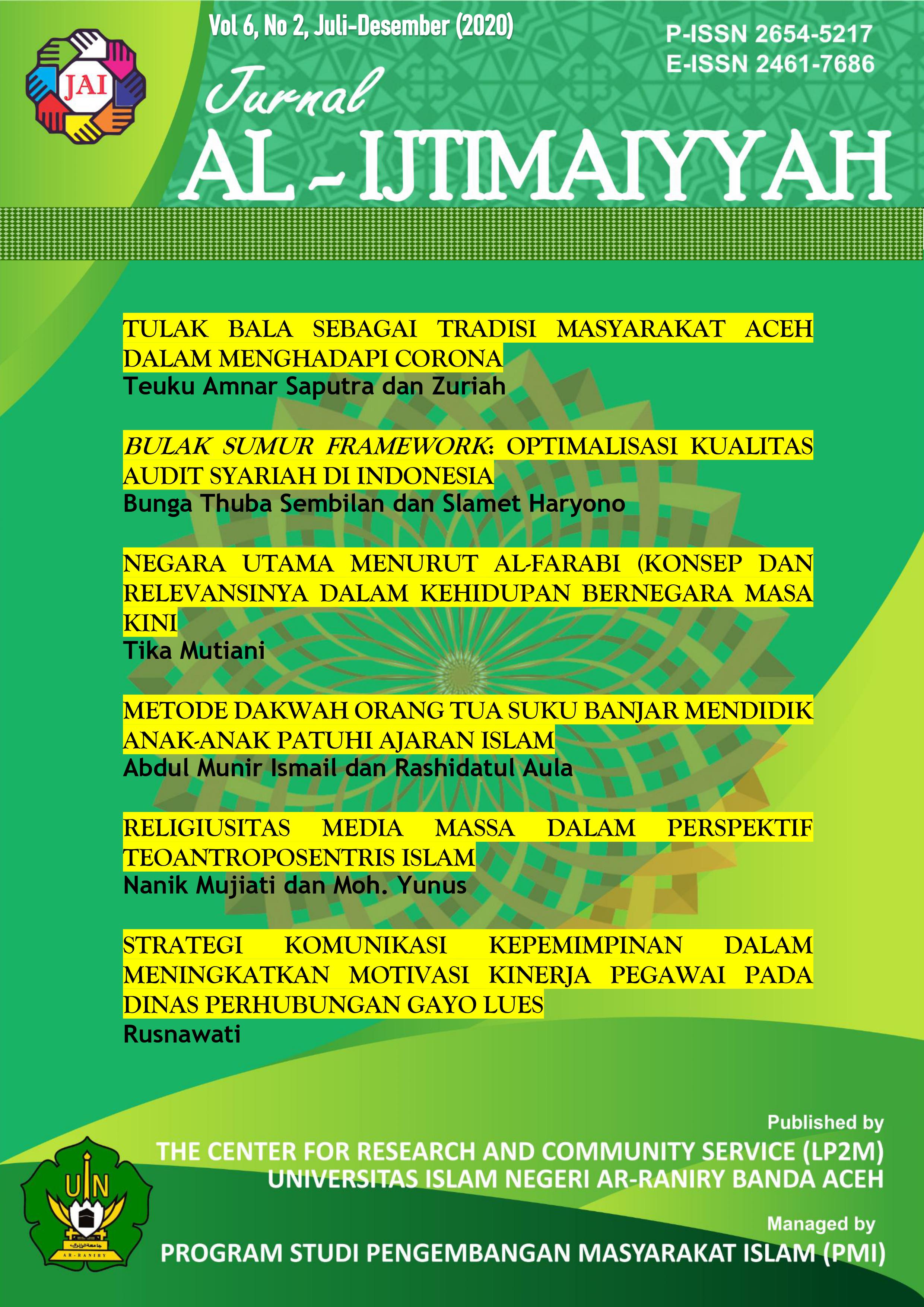STRATEGI KOMUNIKASI KEPEMIMPINAN DALAM MENINGKATKAN MOTIVASI KINERJA PEGAWAI PADA DINAS PERHUBUNGAN GAYO LUES
DOI:
https://doi.org/10.22373/al-ijtimaiyyah.v6i2.7845Abstract
The number of employees lacking discipline in entering, leaving work hours, lack of enthusiasm at work, not showing the level of performance at work, and several of these factors occur in the Gayo Lues Transportation Agency. This study aims to determine the Constraints faced by Leaders in Increasing Employee Motivation at the Gayo Lues Transportation Agency, to determine the leadership communication strategy in increasing employee work motivation at the Gayo Lues Transportation Service. This research is a field research (Field research). The method in this research is descriptive method, with a qualitative approach. Data were collected through methods: interviews, observation and documentation. From the results of this study, the authors found that the obstacle to the Department of Transportation was a lack of discipline, lack of facilities and infrastructure and human resource factors, the impact of this made employees appear not to show enthusiasm at work. However, the communication strategy at the Department of Transportation carried out by the leadership with its employees is good even though the communication carried out is not verbal but non-verbal, which is transferred to the Secretary and supported by applicable rules, this rule is applied to part of the strategy of the Gayo Lues Transportation Service. Namely regarding discipline at work, if there are employees who still violate these rules, they will be given sanctions ranging from mild, moderate and severe. Suggestions given by researchers to get maximum results, personal approach must be improved. Without ever differentiating employees from one another which can lead to conflict and jealousy by each employee.
Keywords: Communication Strategy, Leadership, Motivation, and Employee Performance.
References
Abd. Wahab H.S & Umiarso, Kepemimpinan Pendidikan dan Kecerdasan Spiritual, Yogyakarta: Ar-Ruzz Media, 2010.
Abdul Hakim, Metodologi Penelitian, Jawa Barat: CV Jejak, 2017.
Abu Ahmadi, Sosiologi Pendidikan, Jakarta: Rineka Cipta, 2004.
Andi Susanto, Pengaruh Komunikasi, Kepemimpinan dan Motivasi Kerja Terhadap Kinerja Karyawan Studi Pada Kantor Wilayah XII Direktor Kekayaan Negara (DJKN) Banjarmasin (Online), Vol 1, No. 2 Juni (2013).
Cangara Hafied, Pengantar Ilmu Komunikasi, Jakarta: Raja Grafindo, 2011.
Deddy Mulyana, Komunikasi Efektif: Suatu Pendekatan Lintas Budaya, Bandung: Remaja Posdakarya, 2004.
Departemen Pendidikan dan Kebudayaan, Kamus Bahasa Indonesia, Jakarta: Balai Pustaka, 2002.
Dharma, Surya. Manajemen Kinerja, Falsafah, Teori dan Penerapannya, Yogyakarta: Pustaka Pelajar, 2004.
John Aldair, Menjadi Pemimpin Efektif, Jakarta: Binaman Pressindo, 1994.
John. M. Echol, & Hasan Shadily, Kamus Inggris Indonesia, Jakarta: Gramedia, 1996.
Lexy Meleong, Metode Penelitian Kualitatif, Bandung: Remaja Rosdakarya, 2010.
Moh. Uzer Usman, Menjadi Guru Profesional, Jakarta: Rosda Karya, 1992.
Onong Uchana Effendy, Ilmu, Teori dan Filsafat Komunikasi, Bandung: Citra Bakti, 2003.
Purwono Sastro Amijoyo dan Robert K. Cuningham, Kamus Inggris-Indonesia, Semarang: Widya Karya, 2009.
Sukarto Indrafachrudi dan J.F. Tahalele, Mengatur Bagaimana Memimpin Sekolah yang Baik, Jakarta: Ghalia Indonesia, 1996.
Suryosubroto, Proses Belajar Mengajar di Sekolah, Jakarta: Rineka Cipta, 2002.
Wahid Umaimah, Komunikasi Politik, Bandung: Remaja Rosdakarya, 2018.
Syaiful Bahri Djamariah, Psikologi Belajar, Jakarta: Rineka Cipta, 2008.
Tim Redaksi, Kamus Besar Bahasa Indonesia, Jakarta: Balai Pustaka, 2002.
W.J.S Poewadarminta, Kamus Umum Bahasa Indonesia, Jakarta: Balai Pustaka, 2005.
Downloads
Published
Issue
Section
License
Authors who publish in Jurnal Al-Ijtimaiyyah agree to the following terms:
- Authors retain copyright and grant the journal right of first publication with the work simultaneously licensed Attribution-ShareAlike 4.0 International (CC BY-SA 4.0) that allows others to share the work with an acknowledgment of the work's authorship and initial publication in this journal.
- Authors are able to enter into separate, additional contractual arrangements for the non-exclusive distribution of the journal's published version of the work (e.g., post it to an institutional repository or publish it in a book), with an acknowledgment of its initial publication in this journal.
- Authors are permitted and encouraged to post their work online (e.g., in institutional repositories or on their website) prior to and during the submission process, as it can lead to productive exchanges, as well as earlier and greater citation of published work. (See The Effect of Open Acces)











